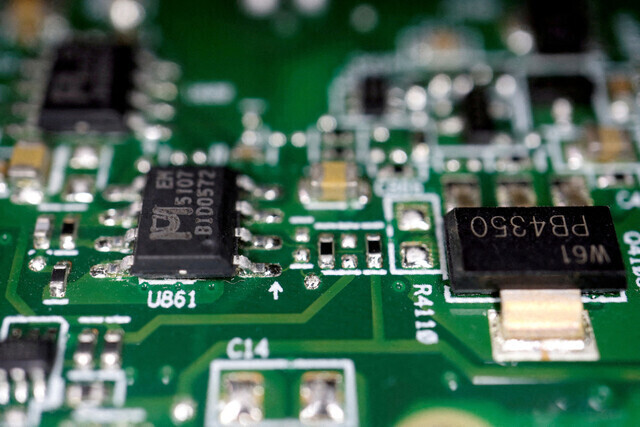hankyoreh
Links to other country sites 다른 나라 사이트 링크
Why Korea’s stock market has become an ‘overnight beggar’ amid AI cycle spoils

Once upon a time, the neologism “overnight beggar” was widely used in Korea. The phrase refers to a person whose income hasn’t changed drastically but feels like a pauper when comparing themselves to those who have suddenly seen their stock and real estate prices skyrocket.
Recently, the South Korean stock market has started to feel like it has become an “overnight beggar,” because, while the stock markets of major global economies are reaching record highs — with even the Chinese stock market rebounding strongly after three years of sluggishness — the South Korean stock market has remained flat, increasing the sense of relative poverty.
In particular, South Korea’s sudden plummet into poverty has been exacerbated by the global boom in artificial intelligence. Stocks in Taiwan, which is competing with South Korea to see who can reap more of the benefits of the AI cycle, have rallied higher, intensifying the jockeying over market capitalization between Korea and Taiwan. While there have been occasional shifts in market capitalization between Taiwan and South Korea before and after the COVID-19 pandemic, the gap between the two countries’ market capitalizations has never been as wide as it has been recently.
As of May 23, Taiwan’s market capitalization was about 1.27 times that of South Korea. Considering that Taiwan’s nominal gross domestic product (GDP) is expected to be only 44% of South Korea’s GDP in 2023, it is no exaggeration to say that the South Korean stock market has become a beggar overnight.
The disparity between South Korean and Taiwanese stocks has grown even more prominent in 2024. As of May 23, KOSPI’s annual growth rate remains at 2.5% while Taiwan’s TWSE has surged 20.5%. The widening gap in the market capitalization between the two countries is largely due to the stock price differentiation of their leading stocks. Taiwan’s market bellwether, TSMC, has surged nearly 50% so far in 2024, a percentage increase that Samsung Electronics’ stock cannot compare to.
This suggests that South Korean semiconductor companies like Samsung have not, contrary to prior expectations, benefited as much from the AI cycle boom and the US-led reorganization of semiconductor supply chains as their Taiwanese counterparts.
However, domestic semiconductor exports have risen sharply since late 2023, leading to a recovery in the domestic economy. The Bank of Korea, which raised its GDP growth forecast for 2024 to 2.1% from 2.5%, also cited the recovery in the semiconductor cycle as a reason for that decision.
While the recovery of the semiconductor industry is encouraging for the Korean economy, the South Korean semiconductor industry may find itself becoming a frog in slowly boiling water if it does not hurry to seek investments in technological innovation.
The world has entered a chip war, an endless battle for semiconductor hegemony. The US, China, and even the EU have jumped in to participate in this war, with the US and EU planning to prop up their industries with subsidies in the ballpark of US$81 billion.
China, Japan, India and Saudi Arabia are also actively participating in the war. South Korea has also declared its participation in the war by announcing plans to provide 28 trillion won to strengthen the competitiveness of its semiconductor industry. Though it may be late, this is welcome news.
But it remains to be seen whether Korea’s chip industry — and indeed, its stock market — will be able to shed its overnight beggar status. To the victor go the spoils, and to come out on top in the chip war, Korea will need to keep up even bolder and more proactive industrial policies.
By Park Sang-hyun, economist at Hi Investments & Securities
Please direct questions or comments to [english@hani.co.kr]

Editorial・opinion
![[Editorial] Exploiting foreign domestic workers won’t solve Korea’s birth rate problem [Editorial] Exploiting foreign domestic workers won’t solve Korea’s birth rate problem](https://flexible.img.hani.co.kr/flexible/normal/500/300/imgdb/original/2024/0626/5517193887628759.jpg) [Editorial] Exploiting foreign domestic workers won’t solve Korea’s birth rate problem
[Editorial] Exploiting foreign domestic workers won’t solve Korea’s birth rate problem![[Column] Kim and Putin’s new world order [Column] Kim and Putin’s new world order](https://flexible.img.hani.co.kr/flexible/normal/500/300/imgdb/original/2024/0625/9617193034806503.jpg) [Column] Kim and Putin’s new world order
[Column] Kim and Putin’s new world order- [Editorial] Workplace hazards can be prevented — why weren’t they this time?
- [Editorial] Seoul failed to use diplomacy with Moscow — now it’s resorting to threats
- [Column] Balloons, drones, wiretapping… Yongsan’s got it all!
- [Editorial] It’s time for us all to rethink our approach to North Korea
- [Column] Why empty gestures matter more than ever
- [Editorial] Seoul’s part in N. Korea, Russia upgrading ties to a ‘strategic partnership’
- [Column] The tragedy of Korea’s perpetually self-sabotaging diplomacy with Japan
- [Column] Moon Jae-in’s defense doublethink
Most viewed articles
- 1CIA record confirms US ‘completely destroyed’ Seoul’s Haebangchon in 1950 bombardment
- 2Dispatched into unknown danger, foreign day laborers were defenseless against blaze
- 3Blaze at lithium battery plant in Korea leaves over 20 dead
- 4How 17 km of river could be a fertile bed for NK-China-Russia cooperation
- 5[Editorial] Exploiting foreign domestic workers won’t solve Korea’s birth rate problem
- 6Three expert views of the war in Gaza: From a Hamas official to Israel’s ambassador in Seoul
- 7North Korea sends trash balloons into South for second straight night
- 8[Editorial] Workplace hazards can be prevented — why weren’t they this time?
- 9North Korea, Russia are going backward into history, Yoon says of new defense pact
- 10How sanctions are backfiring to fuel a new Eurasian alliance